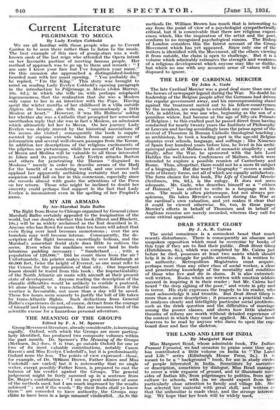THE LIFE OF CARDINAL - MERCIER
. " By John A. Gade
The The late Cardinal Mercier was a good deal more than one of
the heroes of newspaper legend during the-War. No doubt his leadership of the Belgian people after the Germans had driven the regular government away, and his uncompromising stand against the treatment meted out to his fellow-countrymen by the invaders, are enough to establish any one man's fame. Yet, in addition, he was one who, beginning as the son of a penniless widow, had become at the age of fifty-six Primate of Belgium • to this exalted post he passed direct from having conducted for nearly twenty years the Institute of Philosophy- at Louvain and having accordingly been the prime agent of the revival of Thomism in Roman Catholic theological teaching ; as archbishop, he took a leading part in the age-old Belgian disputes over schools, language, and suffrage; Ximenez of Spain four hundred years before him, he lived in his archi- episcopal palace at Malines a life of monastic simplicity ; and finally, after the War, he sponsored with the late Lord Halifax the well-known Conferences of Malines, which were intended to explore a possible reunion of Canterbury and Rome. Thus, altogether, there could not be a more fit subject of a biography. But the 'word _`..` biography " covers a multi- tude of literary forms, not all of which are equally satisfactory. The form chosen for this book, The Life of Cardinal Mercier (Scribners, 10s. -6d.), is the eulogy. It does not seem adequate. Mr. Gade, who describes himself as a " citizen of Hainaut," has elected to write in a language not his own. The result is often picturesque, but not always per- spicuous. He takes Mercier's conduct during the War at the cardinal's own valuation, and yet makes it clear that it could be viewed otherwise. So, too, in these pages Mercier's efforts in behalf of Thomism and in behalf of Anglican reunion are merely recorded, whereas they call for some critical appraisal.
















































 Previous page
Previous page